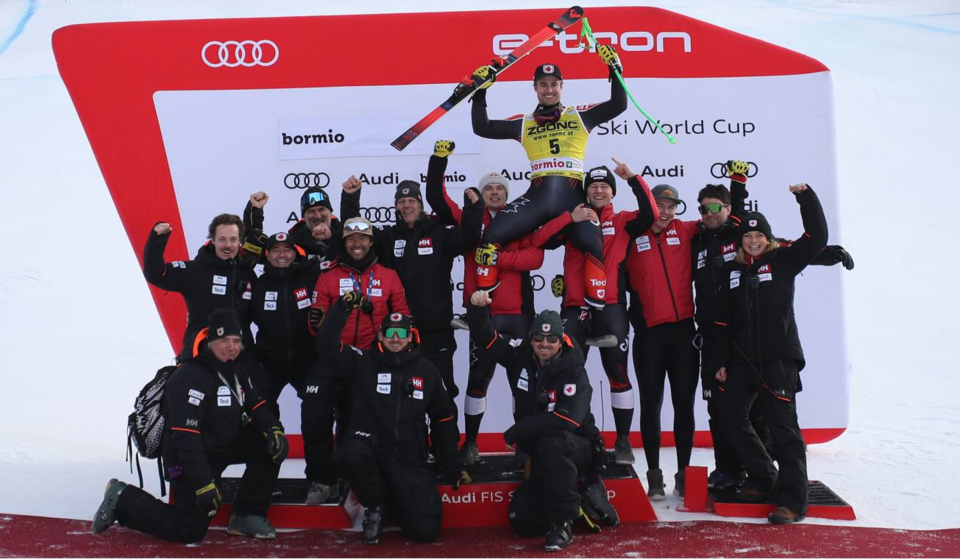Cameron Alexander closed out 2023 with a bang in Bormio.
The 27-year-old made his way down a demanding Stelvio course in one minute and 51.96 seconds: fast enough to earn the second FIS World Cup medal of his career. Cyprien Sarrazin of France (1:50.73) earned gold, while Swiss two-time world champ Marco Odermatt (1:50.82) grabbed silver.
“It means a lot,” Alexander said. “To be able to get a World Cup podium for the second time shows that I'm consistently able to bring speed, and Bormio is a completely different track than Kvitfjell [where I won my first World Cup medal] because Kvitfjell has more flowy, long turns.
“Bormio is a very icy, slick surface. It’s usually quite bumpy as well, and it doesn’t get sun at this time of year so you can’t see a ton. It’s one of the more intense tracks that we ski on the World Cup circuit, and [winning bronze] gives me more confidence that I can compete on different tracks.”
As the fifth man to drop in that day on Dec. 28, Alexander knew he would have to ski aggressively and toe the fine line between victory and disaster. Even top-notch athletes can be tempted to back off and play safe in Bormio, but medals aren’t won that way, so he launched out of the gate with confidence.
Alexander slid into second place before the next racer bumped him to third. He then watched 52 other athletes try and fail to eject him from podium position.
Fellow WMSC members Jack Crawford and Brodie Seger wound up eighth and 46th respectively.
“It benefits me greatly [to compete with guys like that],” said Alexander. “We make each other better by just pushing each other each day in a positive way. We're obviously all very competitive and we all have our own goals, but we understand that one guy skiing fast makes another guy ski fast. We use that to continue to push ourselves.”
'I feel good'
Like many of his fellow alpine daredevils, Alexander has paid a price in his quest for world-class glory. The North Vancouver native has two major knee injuries in his past: a torn ACL in December 2020 and a blown meniscus in 2022. He’s stayed the course, however, and continues to trend upward after a milestone World Championship bronze last February.
“I feel good, and that gives me a lot of confidence in our team, our physio and our trainer,” said Alexander. “They've put a really good program together to get me to where I am right now. It took a lot of hard work, but it feels really good to get back to where I want to be.”
Alexander is also shoring up his skill set when it comes to his other main discipline: super-G. On Dec. 15, he put together a seventh-place effort in Val Gardena, Italy, nipping at the heels of Crawford who was sixth.
Things didn’t go quite as well on Jan. 12 in Wengen, Switzerland. Alexander found himself 40th in super-G that day—Crawford paced his compatriots at 13th place, and Jeffrey Read was the next-fastest Canadian in 26th.
“You only get one run in super-G, and you don’t get training runs so you need to be able to execute right away,” Alexander explained. “You need to be able to just go out and trust your skin and, and trust your inspection of the course right away, whereas in downhill, you have a little more time to fill out the course and have a real clear plan of what's going to work. They're both fast and they're both still very fun to ski.”




